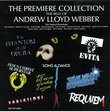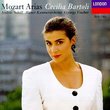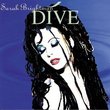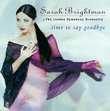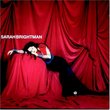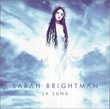| All Artists: Arrigo Boito, Alfredo Catalani, Francesco Cilea, Pietro Mascagni, Amilcare Ponchielli, Giacomo Puccini, Carlo Rizzi, Philharmonia Orchestra of London, Jane Eaglen Title: Jane Eaglen - Italian Opera Arias Members Wishing: 0 Total Copies: 0 Label: Sony Original Release Date: 1/1/2001 Re-Release Date: 9/18/2001 Genre: Classical Style: Opera & Classical Vocal Number of Discs: 1 SwapaCD Credits: 1 UPC: 696998944329 |
Search - Arrigo Boito, Alfredo Catalani, Francesco Cilea :: Jane Eaglen - Italian Opera Arias
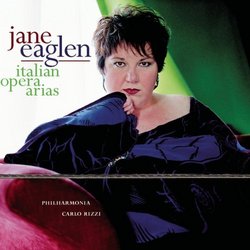 | Arrigo Boito, Alfredo Catalani, Francesco Cilea Jane Eaglen - Italian Opera Arias Genre: Classical
Jane Eaglen, today's most acclaimed interpreter of Wagnerian heroines, takes on 11 post-Verdian ones, only three of whom she has portrayed on stage: Ponchielli's Gioconda, Puccini's Turandot, and Santuzza from Mascagni's... more » |
Larger Image |
CD DetailsSynopsis
Amazon.com Jane Eaglen, today's most acclaimed interpreter of Wagnerian heroines, takes on 11 post-Verdian ones, only three of whom she has portrayed on stage: Ponchielli's Gioconda, Puccini's Turandot, and Santuzza from Mascagni's Cavalleria rusticana. The program is an interesting mix of beloved and unfamiliar arias. In addition to the operas already mentioned, they come from Cilea's Adriana Lecouvreur, Catalani's La Wally, Boito's Mefistofele, and several from Puccini. The disc begins with Butterfly's famous "Un bel di" and closes with her heartbreaking death scene. Eaglen's resplendent voice illuminates every note, soaring triumphantly and effortlessly over the orchestra. The top range especially is glorious; there are numerous thrilling high B-flats, B's, and C's. Her voice is a bit heavy for the lightness of "Un bel di" and the coloratura in "Mefistofele," but Eaglen projects Marguerite's madness with extraordinary empathy. Though renowned primarily for her dramatic roles, she seems to have the strongest affinity for the lyrical, mournful arias here. Sister Angelica's lament for her dead child, Adriana's somber resignation, and Santuzza's aching sorrow are especially memorable. Butterfly's death is perhaps the disc's highlight, both for the intensity of expression and the glorious singing. It is, of course, very difficult to create operatic characters in excerpts performed out of context. There is not enough differentiation between these very dissimilar heroines, but Jane Eaglen's incomparable voice and emotional honesty make one long to hear her bring them fully to life in the opera house. --Edith Eisler Similarly Requested CDs
|
CD ReviewsMAGNIFICENT ARIAS RICHLY DELIVERED Gail Cooke | TX, USA | 01/28/2002 (5 out of 5 stars) "Sung with beauty, energy, and endurance these well-loved arias are superbly rendered by soprano Jane Eaglen. Butterfly, Margherita, and Sister Angelica have seldom been given such heartfelt life. This CD focuses on the work of the incomparable Giacomo Puccini, presenting seven arias from five operas. Granted, I have a bias here because of my admiration of this composer's work, nonetheless I would unequivocally state that these arias find hitherto unexplored dimensions with the emotional and vocal agility of Eaglen. Her voice embracing "Che tua madre" is especially moving. With Tosca we again experience "Vissi d'arte," now transformed into a poignant prayer. Turandot is, of course, without peer and "In questa reggia" the perfect vehicle for Eaglen to showcase her vocal amplitude and passion. Richly delivered, magnificent arias, what more could one ask? - Gail Cooke" This CD does Jane Eaglen no justice Joy Fleisig | New York, NY United States | 10/22/2001 (2 out of 5 stars) "I believe that Jane Eaglen is the finest soprano of our day for the heavy Wagner roles, perhaps not quite Flagstad or Nilsson, but closer than we've come to them in a long time. I've enjoyed her live Turandot and Isolde at the Metropolitan Opera, and have heard broadcasts of a marvelous Brunnhilde and a promising Gioconda. This CD, however, is a disaster which almost totally misrepresents her. This is partially because she has nowhere near the affinity for Puccini and other verismo composers that she does for Wagner, but the true reason for the failure of this CD is the supremely untheatrical and unmusical conductor who leaches out what limited dramatic feeling Eaglen has to begin with in this repertory. I initially thought that these arias would suit Eaglen very well. As several of the other reviewers have pointed out, she has a huge, beautiful voice with a good technique and a fine legato line. It is also, I would say, a very Italianate voice, her middle register reminiscent almost of Renata Tebaldi at moments, plus rich, powerful low notes. Had it not been for the beauty of her voice, I would have given this disc only one star. Unfortunately, the beauty of Eaglen's voice is all we hear here. She gives little sign of empathizing with the characters she is portraying here. Perhaps because she has sung them stage, she has some feeling for Turandot, Gioconda, and Santuzza (in the Easter Hymn, not 'Voi lo sapete'). Even in these selections, her sense of drama is very generalized, and for most of the disc we don't even get that. Turning up the volume to maximum helps a little, but we shouldn't need to do that. So many emotional moments go for nothing. For example, in 'Che tua madre', Butterfly's thought of going back to her geisha life elicits no shame or terror, and the great cry of 'Morta! Morta! Mai piu dansar!' has nowhere near the impact it should. Admittedly the death scene comes off a little better. My happiness that she included a relative rarity - Fidelia's aria from 'Edgar'- dissipated when it sounded little different than anything else here. Frankly, a great deal of this CD goes in one ear and out the other.It also doesn't help that Eaglen's voice is weakest at the very top. In Wagner this isn't necessarily a problem - once past the 'Hojotoho!', the tessitura of Brunnhilde is actually rather low. In Italian opera, it's much more serious. Here her high notes often sound pinched and bodiless. This mars the arias from 'Butterfly' and 'Adriana', the Easter Hymn, as well as 'Senza mamma', an aria her voice is also too heavy for.I still think that both Eaglen's vocal and dramatic flaws could have been ameliorated by a more sympathetic presence in the pit. I am mystified that a conductor as incompetent as Carlo Rizzi is not only a regular at the Metropolitan Opera (and other major houses), but is actually asked to conduct opening nights and new productions there. It is amazing that an Italian conductor has absolutely no feel for Italian opera. Rizzi has ruined just about every performance I've ever heard him conduct live (at one point making even the 'Triumphal March' from 'Aida' into a crashing bore!), and even destroyed the stunning Olga Borodina's solo arias album on Phillips. The tempi he takes here are not only slow but also lifeless. Not only that, in any extended orchestral passage, such the introduction to 'L'altra notte', he has the Philharmonia play individual notes instead of phrases. After hearing Rizzi ruin Eaglen here, I'm very glad I decided beforehand to skip her Met 'Norma' when I found out that he was conducting it. To be fair to Rizzi, he has gotten some good reviews in Wagner and Strauss (repertory he says he prefers) and Janacek, but then what is he doing on THIS album? The Covent Garden chorus does about as well as they can under the circumstances. I am disappointed that they were not used in the 'Turandot' excerpt as well as the ones from 'Edgar' and 'Cavalleria Rusticana'. It is also a pity that Sony didn't get a supporting tenor to be Calaf and Pinkerton and a mezzo to be Mamma Lucia in the appropriate excerpts.While there are individual tracks that I would want to hear again (probably her Tosca, Turandot and Gioconda), I don't think I want to listen to the CD again in its entirety. Indeed, it is one of the very few opera recitals I've heard that I didn't want to listen to in one sitting. Unless you can get a copy for considerably less than full price, borrow it from a friend or the library, or listen to it on a record store listening station. Better idea - if you want to hear this music sung by a contemporary soprano, buy Galina Gorchakova's new Italian arias CD on Delos, under the fine baton of Constantine Orbelian. Not everything ideally suits her, but her Butterfly, Tosca, Aida, Manon Lescaut and Forza Leonora are excellent, and have the dramatic fire that is so lacking here. I beg people reading this not to judge Eaglen on the basis of this CD. I think she is one of the many artists, both historical and contemporary, who simply do not sound as good on records as they do live. Still, if you do want to hear her on CD, her Wagner/Bellini album under Mark Elder comes off much better than this. What I little have heard of her English language 'Tosca' is also impressive, and I look foward to her upcoming English recordings of 'Turandot' (with Nicolai Gedda as Altoum!) and 'Aida'. Of course, these recordings feature a far superior conductor, David Parry. Why doesn't he get all the contracts with major opera houses and recording labels that Rizzi does?" Jane Eaglen's new CD is a demonstration of Beautiful Singing James Walters | Seattle, WA | 10/01/2001 (4 out of 5 stars) "However sometimes she sings a little too beautifully....but we'll come back to that. I found the entire CD to be gorgeously sung. Her voice is exquisite and easy through all registers. Her ultimate note on Un Bel Di is shorter than most versions we've heard of this aria, but it is to expected when coming from a voice of her size, Butterfly usually being sung by a Full Lyric Soprano. I found the other two Butterfly's to be extremely well sung, with incredible line, and beauty of tone through-out (and what gorgeous high notes!) Of all the selections I believe tracks 2, 3, 4, 8, 10, 11, and 12 to be the best. I also liked her "Suicidio" however there were moments in the piece where I would have liked to hear more chest voice, and likewise in the final Butterfly aria I felt that Butterfly's anguish was slightly under expressed. It seems that in an effort to have a beautiful line and tone Eaglen sometimes sacrifices some of the emotion of the piece. Occasionally an ugly snarly chest tone is appropriate in verismo. However to say that there was a crack in her high note in "In questa reggia" is simply to demonstrate a lack of an ear from the listener. The CD comes highly recommended, but in my opinion a few of the arias are not definite versions."
|

 Track Listings (14) - Disc #1
Track Listings (14) - Disc #1